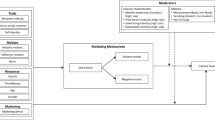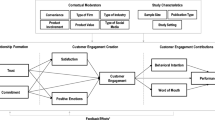Abstract
After a service failure, consumers make appraisals or assessments about the characteristics of this failure. These appraisals, in turn, affect how a consumer responds emotionally and behaviorally. Using an appraisal-tendency framework, we predict that two negatively valenced emotions (anger and regret) underlie or mediate the effects of consumers’ appraisals about service failure on post-purchase behaviors. Consistent with the predictions, in a laboratory study, we find that anger plays a powerful role in explaining retaliatory behaviors, and that both anger and regret account for the effect of appraisals on conciliatory behaviors. We extend the same appraisal-tendency framework to predict how changes in emotions underlie the effects of recovery efforts on post-purchase behaviors. Again consistent with predictions, in the laboratory study and in a web-based study, we find that recovery efforts that reduce anger decrease retaliatory behaviors. However, both studies provide less clear-cut evidence about the emotional mediators between recovery efforts and conciliatory behaviors. Because conciliatory behaviors are important behaviors for businesses to promote, future research should explore what other emotions explain recovery effort effects on conciliatory behaviors.

Similar content being viewed by others
Notes
In a report, an anonymous consumer posts a comment describing an experience at a specific restaurant. Only one report described an incident which the consumer thought was their fault. As a result, we eliminated this observation, giving us 299 reports, all services failures in which the consumers blamed the service provider.
References
Averill, J. (1983). Studies on anger and aggression: Implications for theories of emotion. American Psychologist, 38(11), 1145–1160.
Baron, R. M., & Kenny, D. A. (1986). The moderator-mediator variable distinction in social psychological research: Conceptual, strategic and statistical considerations. Journal of Personality and Social Psychology, 51, 1173–1182.
Bearden, W. O., & Teel, J. E. (1983). Selected determinants of customer satisfaction and complaint reports. Journal of Marketing Research, 20(Feb), 221–229.
Bechwati, N. N., & Morrin, M. (2003). Outraged consumers: Getting even at the expense of getting a good deal. Journal of Consumer Psychology, 13, 440–453.
Bettencourt, L. A. (1997). Customer voluntary performance: Customers as partners in service delivery. Journal of Retailing, 73, 383–407.
Blodgett, J. G., Granbois, D. H., & Walters, R. G. (1993). The effects of perceived justice on complainants’ negative word-of-mouth behavior and repatronage intentions. Journal of Retailing, 69(4), 399–428.
Creyer, E. H., & Ross, W. T. (1999). The development and use of a regret experience measure to examine the effects of outcome feedback on regret and subsequent choice. Marketing Letters, 10, 379–392.
DeSteno, D., Petty, R. E., Wegener, D. T., & Rucker, D. D. (2000). Beyond valence in the perception of likelihood: The role of emotion specificity. Journal of Personality and Social Psychology, 78(3), 397–416.
Folkes, V. S. (1984). Consumer reactions to product failure: An attributional approach. Journal of Consumer Research, 10, 398–409.
Folkes, V. S., Koletsky, S., & Graham, J. L. (1987). A field study of causal inferences and consumer reaction: The view from the airport. Journal of Consumer Research, 13, 534–539.
Hess R. L. Jr., Ganesan, S., & Klein, N. M. (2003). Service failure and recovery: The impact of relationship factors on customer satisfaction. Journal of the Academy of Marketing Science, 31(2), 127–145.
Hetts, J. J., Boninger, D. S., Armor, D. A., Gleicher, F., & Nathanson, A. (2000). The influence of anticipated counterfactual regret on behavior. Psychology and Marketing, 17, 345–368.
Hirschman, A. O. (1970). Exit, voice and loyalty: Responses to decline in firms, organizations and states. Cambridge, MA: Harvard University Press.
Lerner, J. S., & Keltner, D. (2000). Beyond valence: Toward a model of emotion-specific influences on judgement and choice. Cognition and Emotion, 14, 473–493.
Lerner, J. S., & Keltner, D. (2001). Fear, anger, and risk. Journal of Personality and Social Psychology, 81(1), 146–159.
Markman, K. D., Gavanski, I., Sherman, S. J., & McMullen, M. N. (1993). The mental simulation of better and worse possible worlds. Journal of Experimental Social Psychology, 29, 87–109.
Olson, J. M., Buhrmann, O., & Roese, N. J. (2000). Comparing comparisons: An integrative perspective on social comparison and counterfactual thinking. In Suls and Wheeler (Eds.), Handbook of social comparison: Theory and research (pp. 379–398), New York: Kluwer Academic/Plenum Publishers.
Richins, M. L. (1987). A multivariate analysis of responses to dissatisfaction. Journal of the Academy of Marketing Science, 15(3), 24–31.
Roese, N. J., Hur, T., & Pennington, G. L. (1999). Counterfactual thinking and regulatory focus: Implications for action versus inaction and sufficiency versus necessity. Journal of Personality and Social Psychology, 77, 1109–1120.
Russell, D. (1982). The causal dimension scale: A measure of how individuals perceive causes. Journal of Personality and Social Psychology, 42, 1137–1145.
Singh, J. (1988). Consumer complaint intentions and behavior: Definitional and taxonomical issues. Journal of Marketing, 52, 93–107.
Simonson, I. (1992). The influence of anticipating regret and responsibility on purchase decisions. Journal of Consumer Research, 19, 105–118.
Smith, A., & Bolton, R. (2002). The effect of customers’ emotional responses to service failures on their recovery effort evaluations and satisfaction judgments. Journal of the Academy of Marketing Science, 30(1), 5–24.
Smith, C., & Ellsworth, P. (1985). Patterns of cognitive appraisal in emotion. Journal of Personality and Social Psychology, 48, 813–838.
Tsiros, M., & Mittal, V. (2000). Regret: A model of its antecedents and consequences in consumer decision making. Journal of Consumer Research, 26, 401–417.
Wirtz, J., & Matilla, A. S. (2004). Consumer responses to compensation, speed of recovery and apology after a service failure. International Journal of Service Industry Management, 15(2), 150–166.
Acknowledgments
This work is based on Carolyn Bonifield's dissertation. We thank the members of that committee, especially Irwin Levin and Baba Shiv, for their extensive comments. In addition, we would like to acknowledge the helpful suggestions from the reviewers and editors at Marketing Letters, especially those of Professor Charles B. Weinberg.
Author information
Authors and Affiliations
Corresponding author
Appendix A: Items in anger, regret, and behavioral intention scales
Appendix A: Items in anger, regret, and behavioral intention scales
Anger:
-
I would feel angry about my experience at this restaurant.
-
I would feel very displeased with the service at this restaurant.
-
The more I think about it, the more hostile I would feel towards the waiter/restaurant.
Regret:
-
I would regret choosing the menu item that I chose.
-
I would feel bad about ordering this menu item.
-
Even before I had left the restaurant, I would know that I had made a bad decision in my choice of menu item.
-
In retrospect, I would feel that I could have made a better choice by choosing a different menu item.
-
I would feel sorry for choosing this menu item.
-
I would feel that if I could do it all over, I would choose a different menu item.
Retaliatory post-purchase behaviors:
If this had happened to you…
-
how likely is it that you would complain to the manager of the restaurant?
-
how likely is it that you would make certain that the restaurant manager knew exactly what you thought about the service?
-
how likely is it that you would tell your friends and acquaintances about this experience?
-
how likely is it that you would try to discourage other people from dining at this restaurant?
-
how likely is it that you would insist on a cash refund (cash discount on today's bill)?
Conciliatory post-purchase behaviors:
If this had happened to you…
-
how likely is it that you would recommend this restaurant to your friends and acquaintances?
-
how likely is it that you would be willing to accept a coupon for $5 off the bill at this restaurant the next time you dined there?
-
how satisfied would you be with a coupon for the next time you dined for $5 off the bill?
-
how likely is it that you would return to this restaurant again the next time you dined out?
-
how likely is it that you would ever return to this restaurant again?
-
how likely is it that you would feel sympathy for the waiter?
-
how likely is it that you would feel sympathy for the restaurant manager?
-
what size tip would you leave the waiter?
Rights and permissions
About this article
Cite this article
Bonifield, C., Cole, C. Affective responses to service failure: Anger, regret, and retaliatory versus conciliatory responses. Market Lett 18, 85–99 (2007). https://doi.org/10.1007/s11002-006-9006-6
Received:
Accepted:
Published:
Issue Date:
DOI: https://doi.org/10.1007/s11002-006-9006-6




